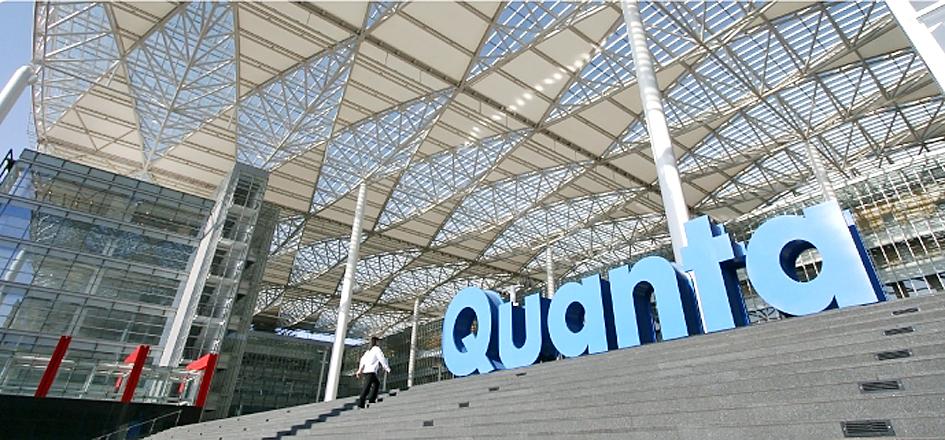Contract laptop makers Quanta Computer Inc (廣達電腦) and Compal Electronics Inc (仁寶) last month reported noticeably muted sales, attributing the trend to unresolved component shortages and logistics woes.
Quanta, the world’s biggest contract notebook computer maker, yesterday posted consolidated revenue of NT$84.72 billion (US$3.05 billion) for last month, down 10 percent month-on-month and 20.1 percent year-on-year.
The company shipped 5.5 million notebook computers, down 6.8 percent month-on-month and 12.7 percent year-on-year, a new monthly low for this year.

Photo: Screen grab from Web site of Quanta Computer Inc
Cumulative revenue for the first eight months of this year was NT$708.71 billion, up 4.9 percent from NT$675.45 billion in the same period last year.
At its last investors’ conference, the company gave a “conservative” outlook, forecasting a 10 percent quarterly drop in shipments due to supply chain and logistics difficulties.
Its goal is to ship 18.3 million laptop computers this year, the same number as last year, it said.
With the traditional high season for the electronics industry coming up, the company said it expects supply chain issues to “remain tense” for at least seven to eight months, affecting its business despite healthy demand.
Meanwhile, Compal yesterday said that consolidated revenue fell 5.2 percent month-on-month to NT$102.39 billion last month, up 22 percent from August last year.
Consolidated revenue in the first eight months jumped 19.7 percent annually to NT$741.36 billion from NT$619.42 billion.
Compal last month shipped 4.7 million laptops, down 4.08 percent month-on-month, but up 34.28 percent year-on-year.
For the first eight months, the company shipped 28.42 percent more laptops, or 35.7 million units.
Although Compal also told investors that it is affected by supply chain shortages and logistics issues, it hopes to ship 10 percent more laptops during this quarter, compared with last quarter.

China’s Huawei Technologies Co (華為) plans to start mass-producing its most advanced artificial intelligence (AI) chip in the first quarter of next year, even as it struggles to make enough chips due to US restrictions, two people familiar with the matter said. The telecoms conglomerate has sent samples of the Ascend 910C — its newest chip, meant to rival those made by US chipmaker Nvidia Corp — to some technology firms and started taking orders, the sources told Reuters. The 910C is being made by top Chinese contract chipmaker Semiconductor Manufacturing International Corp (SMIC, 中芯) on its N+2 process, but a lack

NVIDIA PLATFORM: Hon Hai’s Mexican facility is to begin production early next year and a Taiwan site is to enter production next month, Nvidia wrote on its blog Hon Hai Precision Industry Co (鴻海精密), the world’s biggest electronics manufacturer, yesterday said it is expanding production capacity of artificial intelligence (AI) servers based on Nvidia Corp’s Blackwell chips in Taiwan, the US and Mexico to cope with rising demand. Hon Hai’s new AI-enabled factories are to use Nvidia’s Omnivores platform to create 3D digital twins to plan and simulate automated production lines at a factory in Hsinchu, the company said in a statement. Nvidia’s Omnivores platform is for developing industrial AI simulation applications and helps bring facilities online faster. Hon Hai’s Mexican facility is to begin production early next year and the

TECH BOOST: New TSMC wafer fabs in Arizona are to dramatically improve US advanced chip production, a report by market research firm TrendForce said With Taiwan Semiconductor Manufacturing Co (TSMC, 台積電) pouring large funds into Arizona, the US is expected to see an improvement in its status to become the second-largest maker of advanced semiconductors in 2027, Taipei-based market researcher TrendForce Corp (集邦科技) said in a report last week. TrendForce estimates the US would account for a 21 percent share in the global advanced integrated circuit (IC) production market by 2027, sharply up from the current 9 percent, as TSMC is investing US$65 billion to build three wafer fabs in Arizona, the report said. TrendForce defined the advanced chipmaking processes as the 7-nanometer process or more

Who would not want a social media audience that grows without new content? During the three years she paused production of her short do-it-yourself (DIY) farmer’s lifestyle videos, Chinese vlogger Li Ziqi (李子柒), 34, has seen her YouTube subscribers increase to 20.2 million from about 14 million. While YouTube is banned in China, her fan base there — although not the size of YouTube’s MrBeast, who has 330 million subscribers — is close to 100 million across the country’s social media platforms Douyin (抖音), Sina Weibo (新浪微博) and Xiaohongshu (小紅書). When Li finally released new videos last week — ending what has